COVID-19 UK student survey 2020 – Results
It's no secret that the COVID-19 outbreak has massively altered uni life – but how do students really feel about the impact of the pandemic on their studies and future? Our survey reveals all...

Credit: Stuart Jenner – Shutterstock
COVID-19 has affected the day-to-day lives of all of us – not least students.
Universities across the country have been working hard to respond to the pandemic as quickly and effectively as they can. However, our survey of 2,185 university students in the UK shows that it's still had a significant impact on many aspects of Higher Education.
Read on for the results from the survey, broken down into key categories.
What's in this report?
- Issues facing students due to coronavirus
- What issues worry students the most?
- Are students following social distancing measures?
- How easy is it for students to get help?
- How are students making up for lost income?
- Where have students moved due to coronavirus?
- Are students happy with how their university's responded to the situation?
- Do students expect face to face teaching to return next year?
- How many students are worried about their job prospects?
- Expert comment on our findings
Issues facing students due to coronavirus
First things first: how many students have actually experienced issues at university due to COVID-19? Unfortunately, our survey shows that nearly all students have felt an impact...
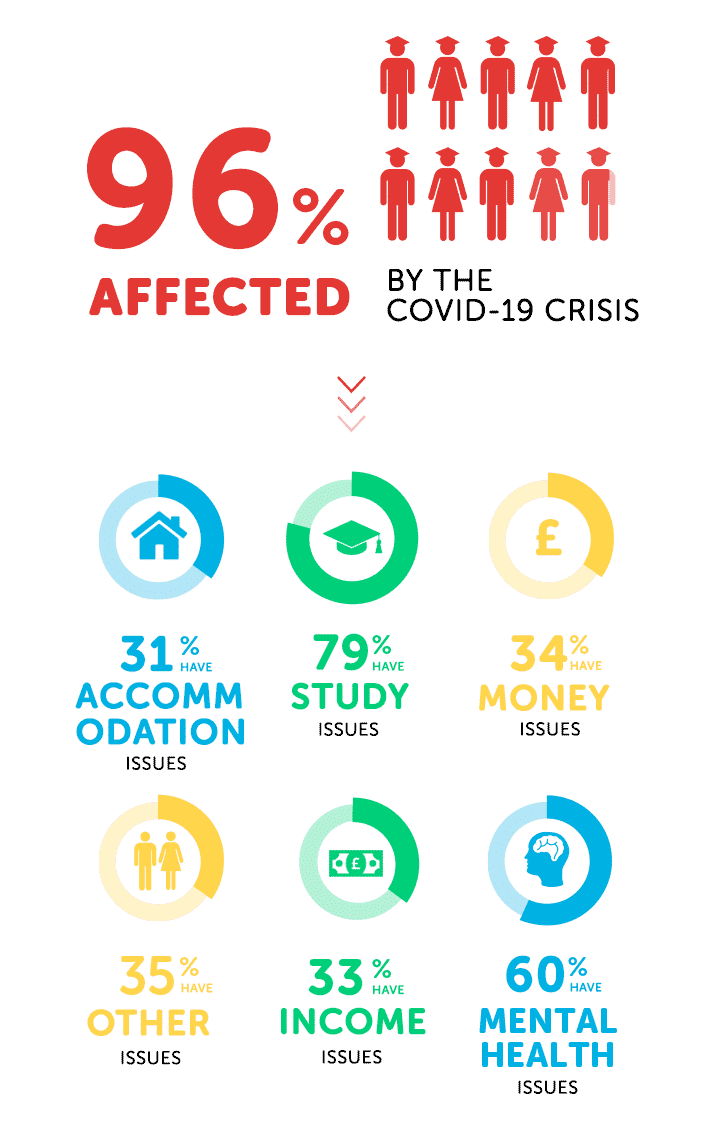
Above all, the pandemic's effect on students' work and mental health are reported as the most widespread issues. And, it's extremely worrying that around a third of students have lost income.
As well as the most common issues above, 15% say that they have had COVID-19 or know someone who has.
What issues worry students the most?
We asked students how they feel about a number of issues they may face in the near future related to COVID-19, and the results were pretty revealing.
Here's a rundown of how many students responded that they're 'really worried' about experiencing each of the issues:
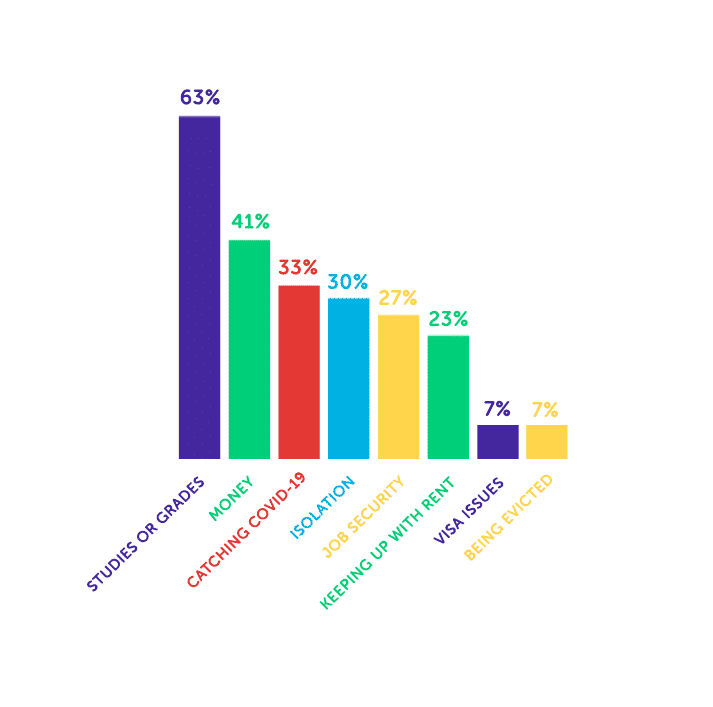
One very surprising stat to come out of this survey is that students are 30% more likely to say that they're really worried about their studies and grades than actually catching COVID-19 itself.
However, particularly with university classes and assessments moving online, it's perhaps no wonder that students are finding it harder to study, leading many to worry about their performance and grades.
Working from home is a big change in itself. But, as 60% have also found that the pandemic has affected their mental health, this could make it harder still for many students to work as productively as they usually would have.
On the impact of working from home on their studies, one student told us:
I am finding I have far less available time to do my work at home. Where at university I can easily achieve 8–12 hours a day, I am lucky to get five at home. [...]
I feel I will not achieve the university grade I would have achieved had I been at university in normal circumstances and it terrifies me.
Are students following social distancing guidance?
A vast majority of students say they have been following the government's guidance regarding social distancing...
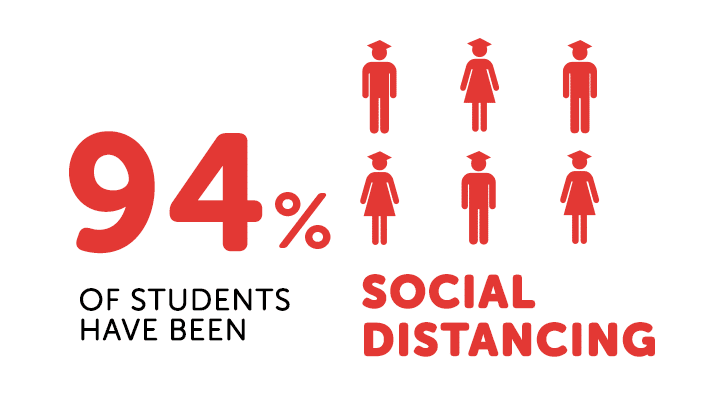
In fact, as few as 1% say that they've not been following the measures, with 5% saying that they've been social distancing most of the time.
But, it's important to note that social distancing is contributing to isolation, which was highlighted as an issue that students are really worried about (30%), or have mixed feelings over (48%). As an example, we were told by a student:
Social distancing rules resulting from the coronavirus pandemic have isolated me from my friends and family leaving my mental health at an all-time low without my usual support network.
With the increased pressures that students are currently facing, it's more important than ever that students are able to access the help they need – but many struggle to reach out for that support.
How easy is it for students to get help?
A worrying 72% of the students we surveyed say that they've needed to ask for help about issues related to COVID-19. Out of these students, nearly half found it hard to ask for help.
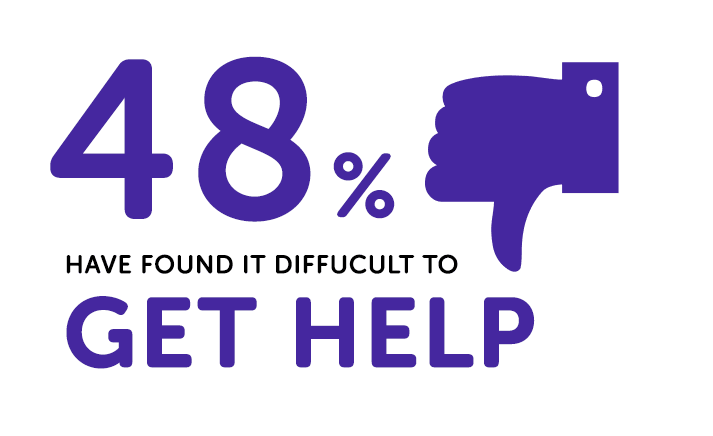
For any students struggling to ask for help over the issues they're facing, we recommend reaching out to friends and family, as well as the support services at university.
In particular, universities will be able to offer specialist advice on a number of issues related to student life, such as studying, student accommodation and money difficulties.
How are students making money following coronavirus?
| Students who have used this | Students who haven't used this but would in an emergency | Students who haven't or wouldn't used this | |
|---|---|---|---|
| Overdraft | 32% | 32% | 36% |
| Parents | 31% | 47% | 21% |
| Selling possessions | 23% | 42% | 35% |
| Credit card | 9% | 25% | 67% |
| Adult work | 7% | 20% | 74% |
| University hardship funds | 7% | 40% | 53% |
| Gambling | 6% | 8% | 87% |
| Payday loan | 4% | 12% | 84% |
| Bank loan | 4% | 24% | 72% |
| Something else | 7% | 17% | 76% |
With fewer students able to rely on money from part-time jobs due to COVID-19, many have had to find alternative sources of funding – particularly if they were on zero-hour contracts and can't be furloughed.
The survey found that the two most common sources of funding for students following the coronavirus outbreak are bank overdrafts and parents – for each option, just under a third of students have turned to them for money.
And, the survey reveals that students are just as likely to use adult work to make money as receive hardship funding from their university.
Rise in students making money from adult work
You might remember that our National Student Money Survey 2019 found that 4% of students had made money through adult work, which was double the figure from 2017.
Our COVID-19 survey reveals that 7% of students have now done adult work. It's concerning that money issues could be the reason more students are turning to this as a source of cash, particularly as 20% say that they haven't, but would in an emergency.
If you're unsure what classifies as adult work, it's worth noting that it doesn't necessarily involve sex – it could be any job or service that involves nudity or erotica, such as selling intimate photos or used clothing.
Where have students moved due to coronavirus?
| Where students have moved | Percentage |
|---|---|
| With parents | 55% |
| N/A – haven't moved | 32% |
| Private landlord | 3% |
| Own property | 1% |
| Private halls | 1% |
| University accommodation | 1% |
| Somewhere else | 6% |
Although 32% of students haven't moved due to the COVID-19 outbreak, over half have moved back in with their parents.
And, interestingly, 'somewhere else' was the third most common choice at 6% – this could include students who have moved in with friends, partners or family members who aren't their parents.
It's worrying to hear that, while many have decided to move because their universities suspended face to face teaching, for others, the move was due to money issues, like this student:
The pandemic has meant having to move away from home and start a full-time job (while still studying full-time remotely) to financially support my family.
Are students happy with their university's handling of coronavirus?
The government have taken the position that universities can continue charging full tuition fees if they're still teaching online in September – but this is on the condition that teaching is up to scratch. So, are students satisfied with their uni's response to COVID-19?
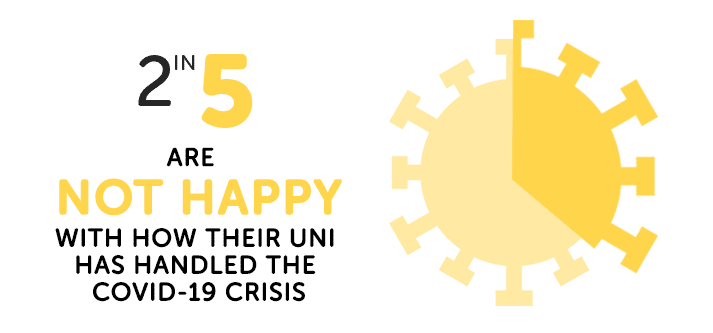
42% of students say that they aren't happy with how their university has handled the pandemic – for these students, there is the option of complaining if they wish to seek compensation.
Do students expect face to face teaching to return soon?
We asked whether students thought face to face teaching would return by summer. Although over half said no, 42% had been expecting to be back on campus before the end of the academic year.
With several universities beginning to announce that lectures will remain online in the next academic year, students should be receiving more clarity over the coming weeks and months regarding whether they'll be expected to return to campuses in September.
How many students worry about finding a graduate job?
Coronavirus, along with Brexit, has hugely impacted the economy, and this is reflected in how students are feeling about getting a job after uni.
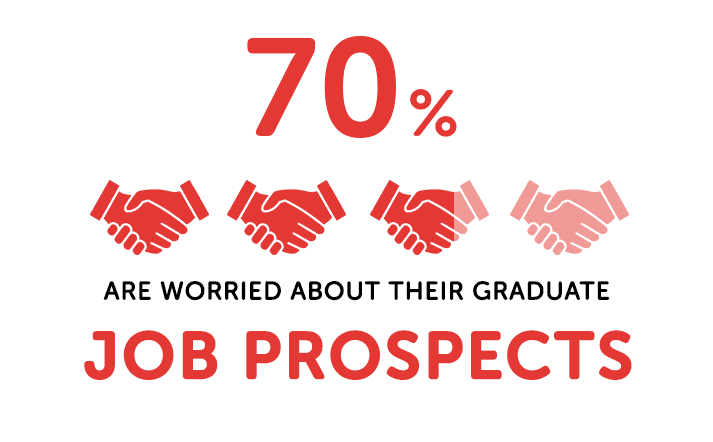
Here's a breakdown of how many students in each year group are worried about their job prospects following the pandemic:
- Students in first year – 67%
- Students in second year – 66%
- Students in third year – 77%
- Students in fourth year and onwards – 70%.
While it's perhaps to be expected that third-year students are the most likely group to be worried about getting a graduate job, the majority of students in each year group are concerned too.
Our comments
The results from our survey have given huge insight into the massive impacts of COVID-19 on students' wellbeings, feelings about university work and expectations for the future.
Our resident student money expert, Jake Butler, said:
These stats show that students have felt the full effect of the COVID-19 crisis. There is a lot of stress and worry centred around the uncertainty of the whole situation.
It's true that nobody could have seen this coming, but both universities and the government need to do more to help students both this year and from September.
At the very least, some sort of clarity would go a long way.
About this survey
Our findings are completely independent: we don't conduct our surveys to sell products to students, or to keep universities and advertisers happy.
Since 2013, we have reached out to university students all over the UK for their honest opinions about university, with a focus on student money. We crunch the numbers to tell it like it is and improve the advice we provide across our website.
If you want to know more about the survey, need case studies, comments or quotes, we're happy to help – contact us.
- Source: COVID-19 UK student survey / www.savethestudent.org
- Survey polled 2,185 university students in the UK between 7th April – 10th May 2020
- Data from previous surveys
- Save the Student Press Page
- Tools and resources.
Student Money Cheatsheet
Download The Student Money Takeaway for free. This printable PDF distils the very best advice from our website onto just two pages, including a one-minute budget sheet. It's designed to be accessible, fun and engaging.
We created this resource in response to the alarming findings from our recent student surveys, particularly with 57% reporting poor mental health due to money worries.









